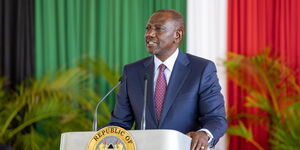In the vision to a thriving and prosperous Kenya, the Safaricom Foundation has shifted its focus to concentrate and empower three key areas of the society.
The Foundation’s Trustees are seeking to widen the organisation’s impact in the health, education and economic empowerment sectors with the three new pillars dubbed Elimu (Education), Afya (Health) and Wezesha (Empowerment).
Having identified lapses in the current structures in the three areas, the foundation strategically designed solutions to facilitate a significant improvement as it also marks 15 years since inception.
The presidency has previously raised concerns over massive skilled labour shortage in the country. For example, Kenya has grappled with a lack of or severe shortage of welders who can work on a live oil pipeline.
The third pillar of the Foundation’s three-pronged strategic plan, Wezesha, will involve addressing the chronic issue of youth unemployment.
The trustees have seen it fit to contribute to alleviate the issue by connecting Kenyan youth to the information, networks, financing prospects and entrepreneurial mentorship.
With a 55 percent unemployment rate among the youth, 62 among women and 68 among rural women, Wezesha aims at playing a critical role in bridging this gap.
66 percent of the country's population compromise the youth aged 15-35 years making their economic empowerment critical to realisation of Kenya's Vision 2030.
More than half a million youth enter the job market annually and the economy has failed to create enough jobs to employ the massive labour force.
It is on this realisation that Safaricom Foundation has responded to the plight of this group which is also vulnerable to criminality, radicalisation and other social vices.
Although this group is capable of alleviating themselves from poverty through entrepreneurship, several challenges are encountered including lack of startup financing, inadequate managerial and entrepreneurial skills.
Besides, the youth lack relevant exposure and networks for starting and growing a business, apprenticeships and have limited information and capacity to utilise youth-focused government funds.
Through Wezesha, Safaricom Foundation plans to address these barriers in specific geographies and to specific youth groups.
With a 2021 target, the programme plans to usher more unemployed youth into self-employment or direct employment.
This objective has informed 7 strategic enablers that include resource mobilisation, monitoring and assessment, and mutually accountable partnerships.
Safaricom Foundation also hopes to achieve the goal through advocacy, marketing and branding, effective governance and a well-oriented management team.
It is a commitment that is set to usher a world of new possibilities through investment and a strategically articulated plan to economically empower young Kenyans through Wezesha.












